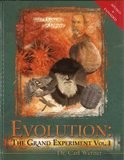
Be Yourself: Survive!
News Source
It’s another example of “evolution in name only”: research conducted by doctoral student Mark Fitzpatrick of the University of Toronto at Mississauga is uncovering how more unique individuals of a species enjoy a survival advantage. But while this finding is labeled as shedding light on the “evolution of behavior,” it bears no resemblance to the molecules-to-man fairy tale popularized as evolution.
Fitzpatrick hoped to test a phenomenon called “negative frequency-dependent selection,” which suggests that “rare variants [of a species] have a better chance of survival—just as a rare strain of the flu has a better chance of spreading through a population that is already immune to more common strains of the virus.” He raised colonies of fruit fly larvae for his experimentation, carefully distinguishing two subtly different variants of the fly—“rovers” versus “sitters”—by applying a green fluorescent protein to one. The “rover” larvae roam in search of food, while the “sitters” are mostly sedentary. Fitzpatrick spent a year carefully counting larvae under a microscope to ascertain the survival success of each type as compared to the other.
In confirmation of the negative frequency-dependent selection hypothesis, Fitzpatrick observed that rovers performed better when in a majority-sitter population, and sitters performed better when in a majority-rover population. Marla Sokolowski, a biologist at the University of Toronto at Mississauga who discovered the gene-guiding fruit fly foraging behavior, explains the dichotomy:
“If you’re a rover surrounded by many sitters, then the sitters are going to use up that patch and you’re going to do better by moving out into a new patch,” says Sokolowski. “So you’ll have an advantage because you’re not competing with the sitters who stay close to the initial resource. On the other hand, if you’re a sitter and you’re mostly with rovers, the rovers are going to move out and you’ll be left on the patch to feed without competition.”
Good science . . . indicates that what is widely referred to as “evolution in action” is never the sort of molecules-to-man evolution Charles Darwin proposed.
This is all well and good, but does this study—an example of useful, observation-based science—contribute to the case for evolution? Does the research only meld with the evolutionary worldview? The answer to both those questions is a resounding “no”; good science, like this study, indicates that what is widely referred to as “evolution in action” is never the sort of molecules-to-man evolution Charles Darwin proposed. The “evolution” we see is not one animal (or plant, etc.) gaining genetic information and changing into another; it’s one animal adapting to its environment through the mechanism of natural selection. Natural selection is an experimentally and observationally supported fact of life that is fully consistent with the Bible.
Evolutionists, however, would love to keep the line blurred, treating any change in a population of a species as scientific support of Darwinism.
For More Information: Get Answers
Remember, if you see a news story that might merit some attention, let us know about it! (Note: if the story originates from the Associated Press, FOX News, MSNBC, the New York Times, or another major national media outlet, we will most likely have already heard about it.) And thanks to all of our readers who have submitted great news tips to us. If you didn’t catch all the latest News to Know, why not take a look to see what you’ve missed?
(Please note that links will take you directly to the source. Answers in Genesis is not responsible for content on the websites to which we refer. For more information, please see our Privacy Policy.)
Recommended Resources

Answers in Genesis is an apologetics ministry, dedicated to helping Christians defend their faith and proclaim the good news of Jesus Christ.
- Customer Service 800.778.3390
- Available Monday–Friday | 9 AM–5 PM ET
- © 2026 Answers in Genesis





